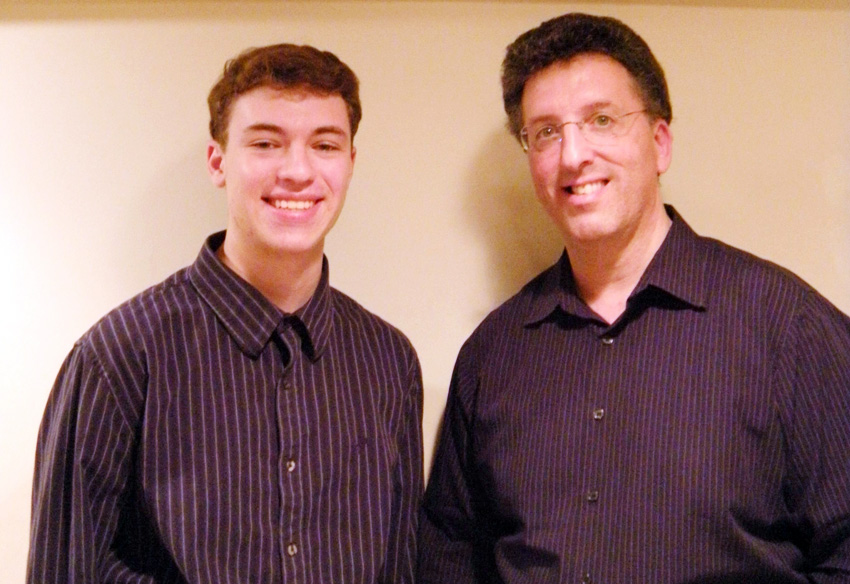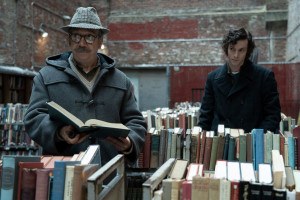Q&A: Father-Son Pair, Jeffrey and Evan Biegel

Evan, left, and father, Jeffrey will perform with the Pro Arte Orchestra this weekend. (Photo provided)
Though pianist Jeffrey Biegel is returning to Boston to perform with the Pro Arte Orchestra this Sunday, it will be the first time that his son Evan, 16, will join him. Here to perform Ellen Taaffe Zwilich’s Shadows, the two are excited to play a piece with so much meaning and soul.
After the Boston Marathon bombing, the Biegels said the theme of their performance will be “Music to Heal.”
Last week, Jeffrey and Evan spoke to us about their performance relationship, their musical pasts, and their upcoming concert on Sunday:
Are you excited to be working as a team for this concert?
Jeffrey: This is my second visit to the Pro Arte Chamber Orchestra. We worked together two years ago, and I’ve worked with the conductor several times. He’s a terrific musician and a brilliant conductor, so for me, personally, to have Evan join me to work with Kevin Rhodes is a really great thing. Evan and I have never worked together in concert like that.
Evan: It’s exciting because I’ve always traveled places and seen my dad perform in concert. I perform with a volunteer organization here on Long Island, so I’ve gotten performance experience, but to perform with my dad, who I’ve seen all my life perform, it’s an honor.
Jeffrey, you came up with Shadows along with the composer, Ellen Zwilich. What sparked the idea for it?
J: I gave it [that] title because I think that we often live in the shadows of many guises, many cultures, many languages, and [I thought] it’d be interesting to have a composer put that into musical language to let people reflect on who they are and where they come from. I knew Ellen could do this because she is able to create music that means something different to everybody, but using the same idea.
Instead of just being in the background, supporting the orchestra, the percussionist is really a soloistic role. Evan has always loved playing the drum set, but Ellen has a drum set with an African bongo called the djembe. It’s a very exciting combination of instrumentation. It also has a lot of jazz and blues in it, which gives it a crossover element from typical classical music.
Evan, you’re pretty young to be performing at such a large scale. When did you start performing?
E: I actually started performing at the beginning of last year. My first performance, I was playing triangle, and I forgot to count the repeat. So it was very stressful, because the triangle can be heard over the entire orchestra—and the counting and everything—it has to be perfect. So I started performing in an orchestra that way, and it’s just progressed, and the more instruments I’ve played and the more concerts, I’ve built up my confidence in performing, which has enabled me to perform this weekend. By myself, though—that’s also exciting—to be on my own and playing many instruments.
Do you guys have any ritualistic ways you like to practice, any way you like to spend time together before performances like this?
J: This is the first time we’re doing this piece together. We’ve never practiced it together because the drum set is in the basement and the piano is on the main level. Evan, you tell Maggie how you’ve been practicing the piece.
E: Besides breaking it down and taking it slow of course, at first, [I’ve been] practicing with the CDs. The premiere was recorded and I’ve been playing along with that, and that’s helped me tremendously. And playing part after part of each movement helps solidify the entire thing.
Do you have any pre-performance things that you’ll do to clear your nerves?
J: I’ll probably annoy him and he’ll tell me to go away. No, I think we’re going to have two group rehearsals. I have to add that the orchestra is Pro Arte, but they’re proactive. They work very hard to build audiences and to keep this orchestra alive. They’ve always been an important musical organization in Boston.
Do you like performing in Boston?
J: I love going there. I first played in Boston in the 1980s at the Isabella Stewart Gardner Museum, and then I played with the Boston Pops in ’97. Evan was a baby, not even a year old.
Is there anything else you want listeners who are coming on Sunday to know?
J: Listen to the music and see how it reflects shadows of their lives and of their heritage. There’s a lot of interesting twists and turns to it. The first movement is very dramatic. It starts quietly, becomes very stormy, and ends quietly. It’s interesting to have a rock drum set sound in a traditional, contemporary, classic piece. The second movement reflects a bit of a Cajun two-step, a bit of an old jazz style. It’s like a funeral, a New Orleans funeral, perhaps.
She basically takes the themes of the first movement and twists them around and shadows the themes in the second movement. The third movement she does the same, but it’s a combination of Klezmer drum and Klezmer clarinetist, with the pianist playing a kind of jazzy horror. She’s reflecting with the djembe, African culture, Jewish culture. What she likes is that the shadows mean something different to everybody.
In light of the tragedy on Monday, Jeffrey wanted to add: “The Shadows piece will take on a very personal meaning for many in Boston attending the performance. I hope many people will come to the concert. Music has a transcending ability to heal and bring listeners to a part of them that nothing else can.”
The Biegels will perform with the Pro Arte Chamber Orchestra at 3 p.m. Sunday, April 21, at All Saints Parish, 1773 Beacon Street, 617-738-1810, proarte.org.


